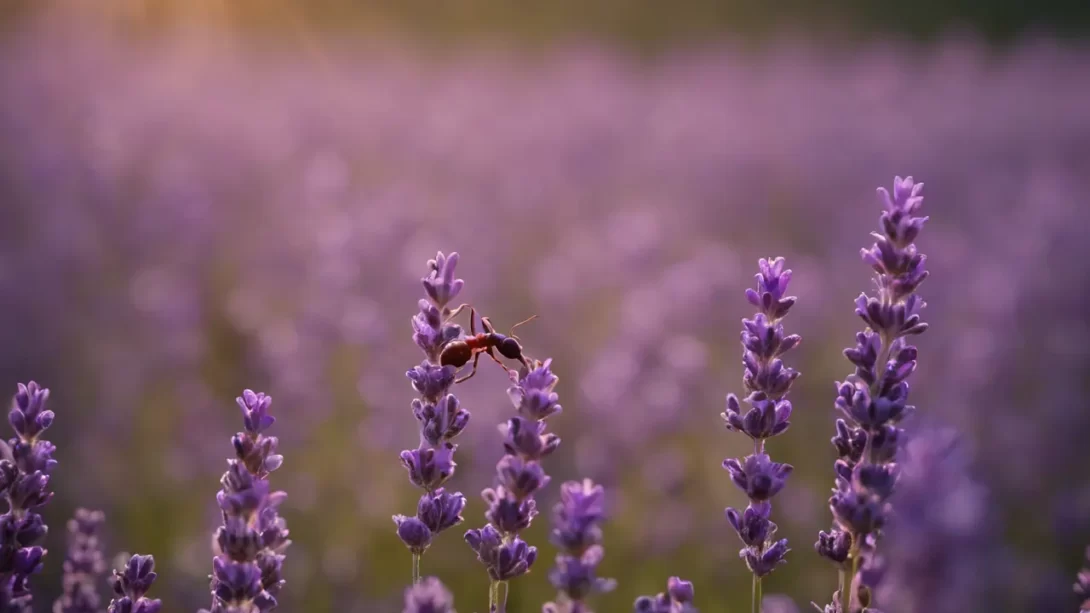Ants are a common concern in both household and garden settings, often prompting the search for effective and natural pest control solutions. Among various natural remedies, lavender is frequently cited for its purported repellent qualities. This article aims to explore the potential of lavender as a natural deterrent against ants, delving into both scientific research and anecdotal evidence.
Lavender
Lavender, known botanically as Lavandula, is a genus of flowering plants in the mint family. Characterized by its fragrant purple flowers, lavender is not only prized for its beauty and aroma but also for its extensive use in aromatherapy, cosmetics, and pest control. The plant contains essential oils that are believed to have repellent properties against a variety of insects, including ants.
Historically, lavender has been used in various cultures for its medicinal and therapeutic properties. In terms of pest control, it is often utilized in gardens and homes for its pleasant scent and potential to repel unwanted insects.
Ant Behavior and Natural Repellents
To understand the potential of lavender as an ant repellent, it is important to first consider the behavior of common ant species. Ants are attracted to food sources and follow scent trails to communicate with each other. The theory behind using natural repellents like lavender is that certain plants can disrupt these trails or create an unwelcoming environment for ants through their natural oils and fragrances.
Natural repellents offer an eco-friendly approach to pest control, minimizing the use of chemical pesticides. The effectiveness of these methods often varies based on the type of ant, the concentration of the natural substance, and the specific conditions in which it is used.
Lavender and Ants: The Connection
The relationship between lavender and ants centers on the plant’s aromatic oils, which are thought to repel various insects. Lavender’s strong scent is attributed to the presence of compounds like linalool and camphor, which are believed to interfere with the ants’ ability to communicate through scent trails. This disruption makes it harder for ants to locate food sources and navigate effectively.
Research into lavender’s efficacy as an ant repellent has produced mixed results. Some studies suggest that lavender oil can repel certain ant species, while others indicate a more limited effect. It’s important to note that the effectiveness of lavender as a repellent can vary based on the concentration of essential oils, the specific species of ant, and the method of application.
Anecdotal evidence and traditional practices also support the use of lavender in deterring ants. Many gardeners and homeowners report success with lavender plants placed around the home or in the garden. However, these experiences can be subjective and may not always be consistent.
Using Lavender for Ant Control
For those interested in using lavender as a natural ant repellent, there are several methods to consider:
- Planting Lavender: Growing lavender plants around the garden or near entry points in the home can help deter ants. The plants’ natural fragrance is released into the air, creating an environment less attractive to ants.
- Dried Lavender: Placing sachets of dried lavender in areas where ants are problematic can be an effective deterrent. This method is particularly useful in indoor settings, such as kitchens and pantries.
- Lavender Essential Oil: Using lavender essential oil in a diffuser or as a spray can repel ants. Mixing the oil with water and spraying it along windowsills, doorways, and other entry points can help keep ants away.
Alternative Natural Ant Repellents
While lavender is a popular choice, there are other natural remedies known to repel ants effectively. These include:
- Peppermint Oil: Similar to lavender, peppermint oil disrupts the scent trails of ants. A solution of peppermint oil and water can be sprayed in areas prone to ant infestations.
- Vinegar: A mixture of water and vinegar can erase the scent trails left by ants, thereby deterring their movement in the area.
- Diatomaceous Earth: A powder made from fossilized algae, diatomaceous earth can be sprinkled in areas where ants are a problem. It works by dehydrating the ants upon contact.
- Citrus Peels: The strong scent of citrus, particularly lemon or orange peels, can be an effective natural deterrent against ants.
Comparing the effectiveness of these alternatives to lavender, it’s clear that the choice of repellent may depend on the specific ant species, the area of infestation, and personal preference for scent.
Conclusion
In conclusion, lavender can be a useful natural repellent against ants, primarily due to its strong scent and essential oil content. However, its effectiveness can vary depending on factors such as the concentration of the oil, the species of ant, and the method of application. For best results, it may be combined with other natural repellents or used as part of a broader pest control strategy.
It’s important to consider that while natural remedies like lavender are a more environmentally friendly option compared to chemical pesticides, they may require more frequent application or combined strategies for maximum effectiveness. Whether using lavender plants, dried sachets, or essential oils, integrating these natural methods can contribute to a holistic approach to managing ant infestations in both homes and gardens.
Ultimately, understanding the behavior of ants and experimenting with various natural repellents like lavender will enable homeowners and gardeners to effectively manage these common pests while maintaining a safe and natural environment.



